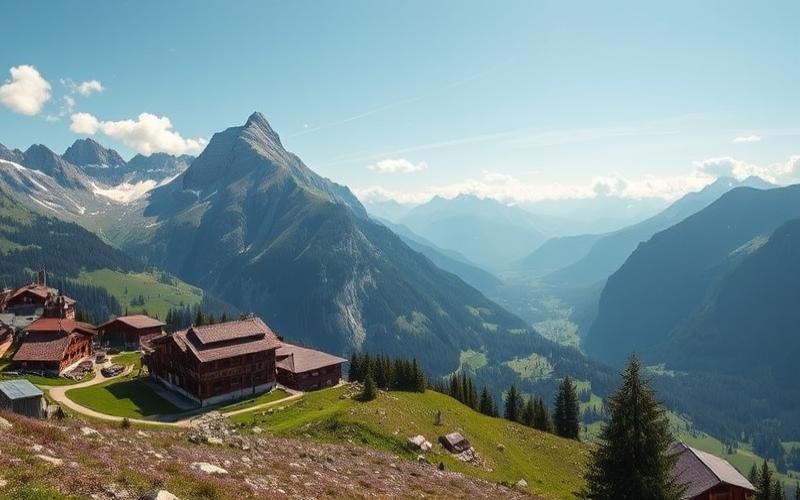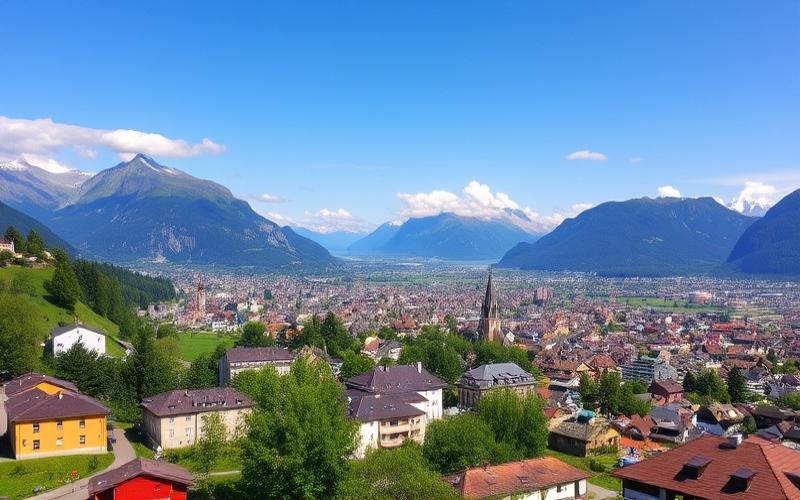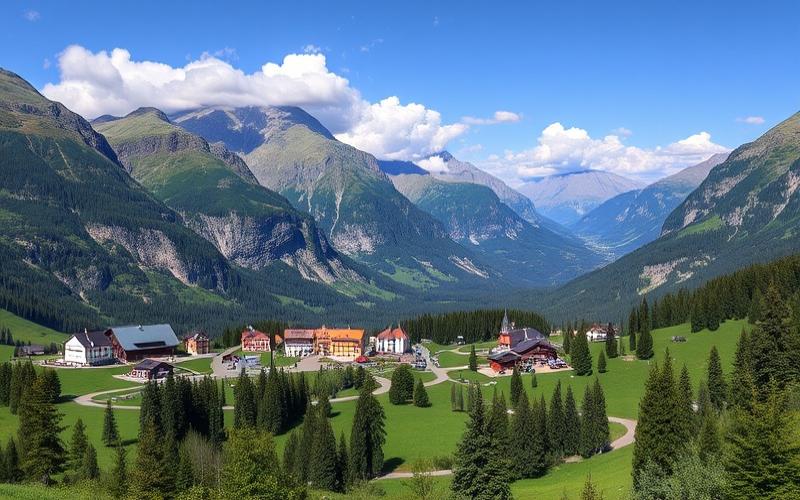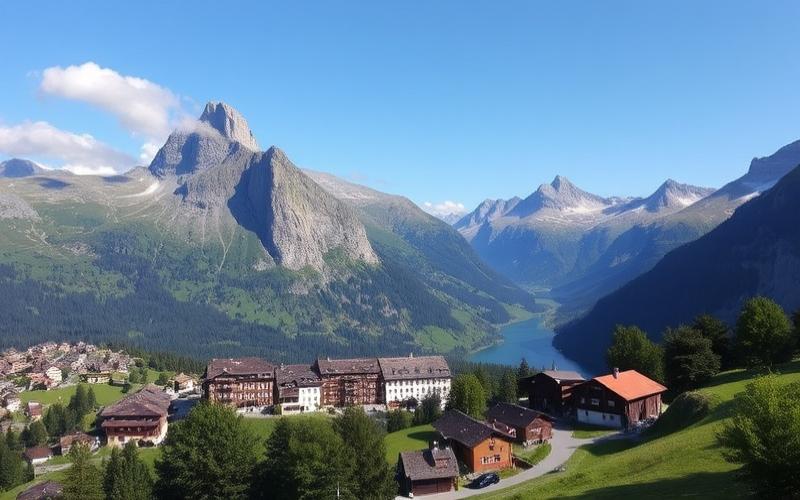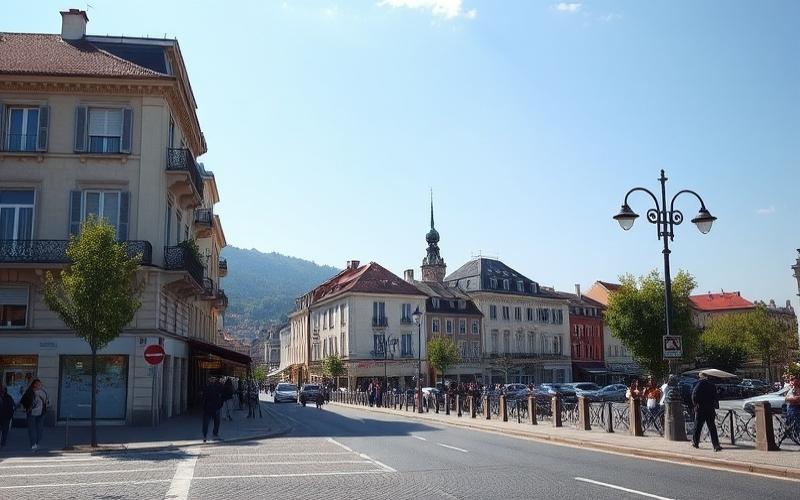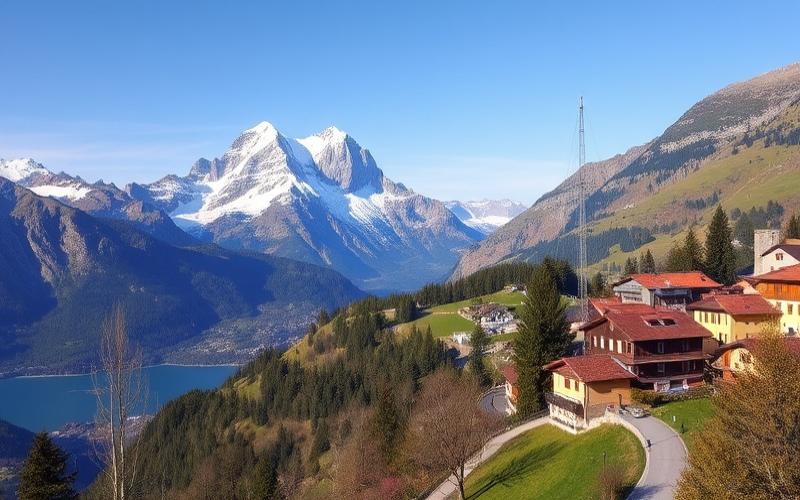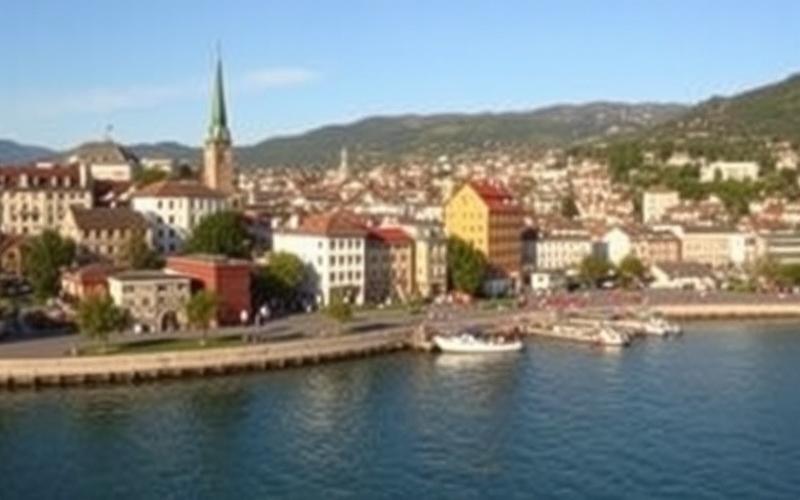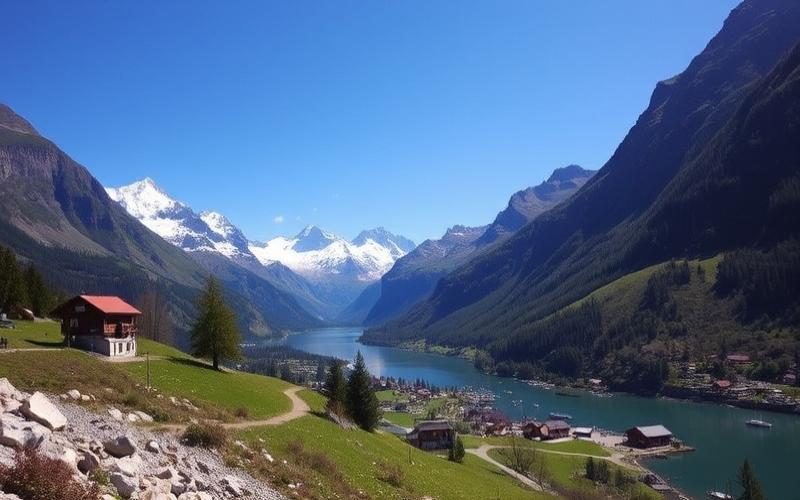
 Published on and written by Cyril Jarnias
Published on and written by Cyril Jarnias
In a context where the Swiss real estate market is increasingly competitive, investing in parking facilities proves to be an often underestimated but particularly promising opportunity. As Swiss cities continue to grow, the need for parking spaces intensifies, leading to constant and growing demand for these often modest but lucrative infrastructures.
By analyzing different aspects of profitability, including rental yield rates and the country’s tax specifics, this article examines the unique and often overlooked advantages that parking facilities represent as real estate assets. Discover how this investment can not only diversify your portfolio but also offer stable and sustainable financial prospects in an evolving market.
Understanding the Swiss Parking Market
The Swiss parking market presents specific characteristics, influenced by local regulations, technological evolution, and regional supply and demand dynamics.
Key Characteristics of the Swiss Parking Market
- Historically stable market with strong demand in urban and tourist areas
- Significant fragmentation between public (municipalities, cities) and private (institutional investors, individuals) players
- Variable returns depending on investor type: large groups benefit from optimized management while individuals may face more profitability challenges
Current and Future Trends
- Continuous growth in the smart parking market, with an average annual rate exceeding 15% until 2025 for Europe
- Transition toward more ecological systems: integrated electric charging stations, infrastructure adapted for clean vehicles
- Strong digitalization: widespread mobile payments, remote booking via dedicated applications
Regional Variations: Demand and Supply
| Region | Demand | Supply | Specific Features |
|---|---|---|---|
| Zurich & Geneva | Very High | Limited | High market tensions in urban areas |
| Basel & Lausanne | High | Medium | Moderate real estate pressure |
| Rural Areas | Low to Medium | Abundant | Supply surplus outside tourist periods |
| Alpine Resorts | Seasonal | Variable | Seasonal peaks during holidays/events |
Cities like Zurich or Geneva concentrate a large share of rental value related to parking due to high urban density. Tourist regions also benefit from strong potential but with more seasonal variations.
Lucrative Geographic Sectors for Investment
- City centers of major Swiss urban areas (Zurich, Geneva)
- Immediate proximity to main train stations or international airports
- Residential neighborhoods under-equipped with private spaces
Local Regulations Impacting the Sector
Regulations vary significantly by canton:
- Strict quotas on the total number of creatable spaces in certain city centers to encourage soft mobility
- Annual tax on each non-residential private space in several municipalities
- Growing standards concerning accessibility for people with reduced mobility and mandatory integration of electric charging stations for new constructions
Some municipalities even strongly limit any new parking-related projects to reduce automotive congestion.
Recent Statistics on Revenue Generated by Swiss Parking Facilities
According to several recent sector analyses:
- Annual gross profitability generally varies between 2% and 6% depending on location and operation mode.
- Overall revenue related to parking activities exceeds several hundred million CHF per year for all of Switzerland.
- The smart parking segment is estimated to exceed 1 billion USD in Europe by 2025.
Impact of Technological Innovations
List of major innovations recently adopted:
- Automated systems guiding to the nearest available space via IoT sensors
- Widespread contactless payment (QR code/banking applications)
Observed effects:
- Notable improvement in average occupancy rate (+10 to +20%) in some pioneering cities thanks to smart solutions.
- Significant reduction in time wasted searching for available spaces.
- Measured decrease in polluting emissions due to parasitic traffic around poorly managed parking facilities.
The combination of “incentive regulation” + “smart technology” now appears as a major lever to sustainably energize the sector while addressing growing environmental challenges.
Good to Know:
In Switzerland, the parking market experiences disparities by region, with strong demand in urban centers like Zurich and Geneva, where supply remains limited. Bern and Lausanne also see increasing interest in investments due to their high vehicle concentration and lack of parking. In terms of profitability, parking facilities located near commercial areas and business centers are particularly lucrative. Regarding regulations, each canton imposes its own standards for the construction and operation of parking facilities, greatly influencing the feasibility of investment projects. Recent technological innovations are transforming the sector, where digital payment systems and mobile applications simplify the user experience and increase the appeal of modernized parking. According to statistics, revenue generated by parking facilities in Switzerland has shown an upward trend, supported by growing urbanization and sustainable mobility strategies.
Advantages of Investing in Swiss Parking Facilities
Investing in parking facilities in Switzerland offers numerous specific advantages related to the country’s economic stability, investment security, and particularities of the local real estate market. Here are the main points to remember:
Advantages Related to the Swiss Context
- Economic Stability: Switzerland is recognized for its political and financial stability, thus offering a secure environment for investors.
- Investment Security: The Swiss market benefits from a strong regulatory framework that protects both owners and tenants.
Regulation and Real Estate Market Dynamics
- Favorable Regulations: The acquisition of parking spaces is governed by clear legislation, facilitating both purchase and rental management.
- Investment Accessibility: Compared to other real estate properties (apartments or commercial premises), the entry ticket for a parking space remains relatively low, making this type of asset accessible to a wider audience.
Demand Trends in Major Cities
- Strong Parking Pressure: In Zurich and Geneva, where urban density continuously increases, finding an available space remains difficult. This scarcity supports constant, even growing demand.
- Sought-After Security: Underground parking facilities with security or video surveillance are particularly prized by urban drivers.
Potential Yield and Diversification
| Asset | Parking | Other Real Estate |
|---|---|---|
| Entry Ticket | Low | High |
| Net Profitability | 5% or more | Approximately 3–4% |
| Management | Simplified | More Complex |
| Fees & Maintenance | Very Low | Higher |
| Rental Vacancy | Rare (Strong Demand) | Variable |
- Rapid Amortization: It is possible to recoup your investment in about seven years thanks to stable rents.
- Attractive Yield: Between 2022 and 2024, revenue from parking facilities increased by an average of 5%, often surpassing that observed in traditional residential properties.
- Portfolio Diversification: Parking facilities allow investors to spread their risk while benefiting from simplified management.
Key Takeaway:
Investing in parking combines attractive yield, easy management, and resilience to economic cycles. In a well-diversified Swiss real estate portfolio, it offers interesting complementarity against risks associated with other segments like housing or commerce.
Good to Know:
Investing in parking facilities in Switzerland offers several key advantages, particularly due to the country’s economic stability and investment security. The Swiss real estate market is supported by favorable regulations that encourage investments, and demand for parking remains strong, especially in major cities like Zurich and Geneva, where land pressure ensures continuous property appreciation. Compared to other real estate investments, parking facilities require little maintenance and management, thus offering attractive potential yield with reduced operational costs. Moreover, the growing need for parking in dense urban areas provides an opportunity for portfolio diversification while benefiting from stable passive income.
Profitability Analysis of Swiss Parking Facilities
Overview of the Swiss Parking Market
The Swiss parking market is characterized by supply under pressure in major cities like Geneva, Lausanne, Zurich, and Basel, where over 11,000 spaces have been eliminated in ten years. In Geneva and Lausanne, the decrease exceeds 10% since 2015. However, in other regions like Fribourg or Bulle, supply remains relatively stable or the trend is not clearly defined. This contraction of urban supply reinforces the scarcity of available spaces and supports the overall profitability of the sector.
Parallel to this reduction in supply in Swiss city centers, the sector benefits from structurally high demand linked to the growth of the automobile fleet and persistent individual mobility needs. The European trend – energized by technological expansion (automated payment, smart management) – is also observed in Switzerland with increased interest in modern parking solutions.
Current Trends:
- Progressive reduction of urban spaces
- Stability or slight decline in some secondary regions
- Demand supported by high level of motorization
- Technological innovations improving operation
Future Forecasts:
- Maintenance of strong demand where supply becomes scarce
- Progressive modernization (digitalization, automation)
- Increased consideration of environmental criteria (greening)
Factors Influencing Profitability
The profitability of a parking facility depends mainly on:
List of Main Factors:
- Acquisition Costs: Prices vary strongly by location (city center vs. periphery); urban land remains very expensive.
- Operating Costs: Regular maintenance (cleaning), possible security, administrative or computerized management.
- Maintenance Costs: Periodic major renovations for underground parking; lower costs for outdoor parking.
Comparative Table Surface/Underground:
| Type | Acquisition | Operation | Maintenance |
|---|---|---|---|
| Underground | Very High | Medium/High | High |
| Surface | Moderate | Low | Low/Moderate |
Other Key Determinants:
- Applied Rates: In central Geneva/Lausanne areas up to CHF 350/month for residential spaces; approximately CHF 30/day for visitor spaces.
- Occupancy Rate/Local Demand: Strong tension where supply is reduced; low vacancy rate outside exceptional periods.
Profitability vs. Other Real Estate Investments
Parking facilities generally offer higher gross profitability than many traditional real estate assets:
Indicative Comparative Table:
| Real Estate Asset | Average Gross Yield |
|---|---|
| Individual Parking | 4–8% |
| Rental Housing | 2–4% |
| Commerce/Offices | Variable (3–5%) |
Specific Strengths of Parking Facilities:
- Less sensitive to economic cycles than offices/commerce
- Simplified management for individual lots
- Rental risk dispersed among multiple users
Case Studies / Concrete Examples
In Geneva between 2022 and 2024: revenue from public parking facilities increased by an average of +5% despite a continuous reduction in the total number of spaces. Some institutional investors report an annual return on investment higher than that observed in traditional residential properties when spaces are located in city centers or near multimodal hubs.
In Fribourg, even after partial elimination (~500 spaces), occupancy rate remains high (>90%) ensuring financial stability for local operators.
Practical Recommendations for Investors
Synthetic List:
- Primarily target central areas/tense mobility where restrictions increase future value;
- Prefer grouped acquisition of multiple spaces rather than a single isolated lot;
- Optimize digital automation to reduce fixed/operating costs;
- Anticipate local regulatory developments that could impact availability/pricing;
- Integrate eco-responsible solutions valued by new public policies;
Investments in Swiss parking facilities remain attractive if selected with geographic rigor and operated via modern management allowing pricing flexibility as well as strict control of recurring charges.
Good to Know:
The Swiss parking market currently shows moderate growth, supported by continuous urbanization and increasing demand in major cities. Trends indicate a progressive rise in parking rates, particularly in urban centers, which can favor profitability. However, high acquisition and maintenance costs, as well as strict regulations, are factors to consider. Comparatively, parking facilities often offer higher profitability than residential rentals due to lower maintenance fees and less demanding management. Notable examples include parking facilities in Zurich and Geneva that have generated double-digit returns on investment. To maximize benefits, it is recommended that investors carefully analyze location, prioritize efficient management to optimize occupancy, and stay informed about technological innovations, such as automated payment systems, which can reduce costs.
Disclaimer: The information provided on this website is for informational purposes only and does not constitute financial, legal, or professional advice. We encourage you to consult qualified experts before making any investment, real estate, or expatriation decisions. Although we strive to maintain up-to-date and accurate information, we do not guarantee the completeness, accuracy, or timeliness of the proposed content. As investment and expatriation involve risks, we disclaim any liability for potential losses or damages arising from the use of this site. Your use of this site confirms your acceptance of these terms and your understanding of the associated risks.



